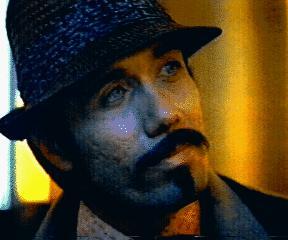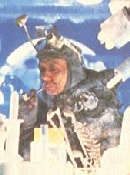
The minus: The version I got has absolutely no extras, not even old material from the previously released Director's Cut.
I'm hoping that it doesn't devolve into a Lucas-style game of a bazillion different editions to force us to have buy a new version every other year. (New for 2007! The widescreen, high-definition, official bootleg extended director's cut with commentaries and extras and tissue samples from all of the actors!)
Blade Runner remains one of those guilty pleasures for me. I know people who take issue with the exoticization of L.A. and the insinuation that in the dystopian future, Asia will have a huge influence on the world, as if that's a bad thing, and people like Edward James Olmos will be speaking a mish-mash of Cityspeak as a result of that confluence.

I thought of it as something to be welcomed. That one day, familiar images from Asia would be as commonplace and ordinary as images from anywhere else in the world, and we'd be less alien to one another.
Oh sure, plenty of people were miserable, but unlike, say, Serenity, there was a certain egalitarian element to that misery. Everyone was equally oppressed by the pollution, the constant rain and darkness.
Some might hate the character of Dr. Chew, the eye manufacturer.

I take it in stride and see him as one of many guys who was working in their particular, isolated loneliness, to create better humans. "More Human than Human."
Eyes are extremely complicated, and so essential to the themes of the movie, that I consider his a key role with which to discuss the other ideas within Blade Runner.

Weighed against a great deal of science fiction before and afterwards, Blade Runner rings as a film with culture that doesn't treat culture like a liability.

And it feels more real and honest as a result. Even more so than does Crash, suppposedly so fixed in today's world.

In many ways, the Replicants are like the Chinese Railworkers of the 1800s or plantation workers. But I'm even more intrigued by the question this presents of: How important are the big issues, the deep issues of life and death, and of what we witness. What does it mean to experience, and to participate.
As the classic last lines of Roy Batty/Rutger Hauer go: "I've seen things you people wouldn't believe... All those moments will be lost in time, like tears in rain."

"I don't know why he saved my life. Maybe in those last moments he loved life more than he ever had before. Not just his life, anybody's life, my life. All he'd wanted were the same answers the rest of us want. Where did I come from? Where am I going? How long have I got? All I could do was sit there and watch him die."
The Replicants weren't out to change the world, they just wanted answers. More time.
It wasn't a Matrix-style, 'let's change the system' call for revolution. It was just trying to resolve universal human and non-human dilemmas.
And I think that has actually affected my poetic and other literary work over my lifetime. But I'm not going to go into that now.
Of course, the fun lingering question is: Is Dekkard a replicant?
Before anyone jumps on me about "Do Androids Dream of Electric Sheep" and all of the Phil K. Dick business, yes, I've checked it out, and yes, I know the larger theme is about a world where it's become impossible to tell human beings from machines because the humans are becoming less humane and empathetic, while the replicants are developing more complex emotions in a weird Frankenstein parable. That's great stuff too.
But I think we're also allowed to analyze a story from different lenses far beyond how the creator may have intended it.
The long and the short of it is, if you haven't gotten around to seeing it yet, the new version is great to watch, and I think, despite a few flaws in the script, that it should remain one of the great classics of science fiction literature.
2 comments:
between us geeks, OK so this looks like my next must-see.
i personally hated the voice over and was relieved that the director's cut did away with that. too over-explanatory otherwise, and the kind of "nostalgia" it seemed to attempt to invoke kind of didn't work b/c the vision of a dystopic future was so strong. there seemed little place for dekkard's waxing philosophical. as a viewer, i never cared about him too much in the first place. nothing about his character was redeeming to me. the scenes between him and rachel (sean young) were disturbing. he was quite forceful with her, and i think he took advantage.
this is how rutger hauer stole the show, i think, not only b/c he was just so beautiful, but b/c his concerns were so urgent. and it was so easy to sympathize with the replicant plight. answers, more time, as you say. that's the least they cd ask for given the fact that they were used as slave labor for their entire lifetimes. and re: the women replicants, i had such a problem with how hypersexualized they were. again, with the disposable humans, you cd literally f*ck em and shoot em in the back as they are running from you, naked. this does nothing but make dekkard even less heroic.
dr. chew was very much a foreign character, and i think this worked well, in terms of decentering america as the alleged epicenter of cutting edge technology. i mean, ASIA. come on now. and here he was, in some ways determining the 'gaze' of the replicant upon the human. wow.
thanks for this.
and i actually dug edward james olmos's hybrid bizarre langauge, as you know, precisely for its decentering of english, just as that futuristic, japanified LA was also almost like a relief, and i didn't grow up in the midwest
:-)
I definitely hear you on this one. My wife and I frequently remark that Dekkard is an anti-hero, and that we shouldn't admire or even root for him. He's even worse than Snake Plissken in Escape From New York.
As you've pointed out, he manhandles women, and shoots them in the back.
And Ford is right, Dekkard is a detective who does no detecting, really.
He barely found Zora, (although the makeshift Voight-Kampf test was interesting) and going up to investigate the apartment where the designer lived is hardly an ingenious move.
It's more like a logical next step.
And, a careful viewer notices that the only people he really kills are women. Leon gets killed by Rachel, and Hauer just dies on his own.
Yeah, Dekkard, you're really good at your job.
Actually, Hauer and Brio James, who played Leon made the film for me, as did M. Emmet Walsh as Captain Bryant and... hmm. ok, the rest of the cast.
Again, Blade Runner stands out for me as a good film, despite its flaws because it is a film you can actually have a conversation around, unlike say, Boogie Man or Final Destination 3, which is nothing but carnage with dialogue, and you're just stuck saying: Man, you're not even trying anymore, are you?
Post a Comment